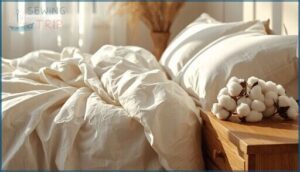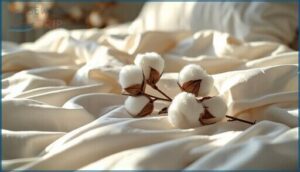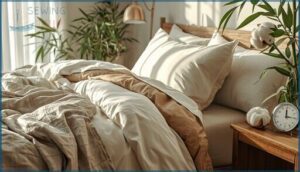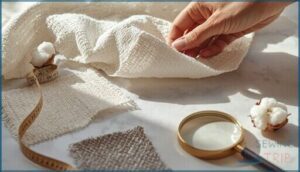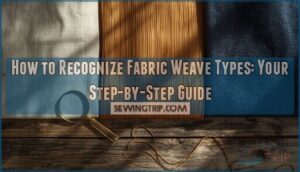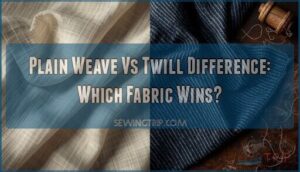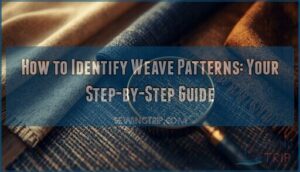This site is supported by our readers. We may earn a commission, at no cost to you, if you purchase through links.
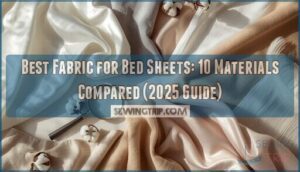
Cotton dominates the market, but the difference between Upland and Egyptian varieties affects fiber length by up to 50%, changing durability and softness dramatically. Understanding these material distinctions helps you match the right fabric to your sleep temperature, skin sensitivity, and budget without falling for marketing myths.
Table Of Contents
- Key Takeaways
- Best Fabrics for Bed Sheets Compared
- Key Factors When Choosing Bed Sheet Material
- Thread Count and Weave: What Matters Most
- Best Bed Sheet Fabrics for Specific Needs
- Top 10 Bed Sheet Products to Consider
- 1. Soft Cotton Full Size Bed Sheets
- 2. Luxury Cotton Queen Sheet Set
- 3. Organic cotton full bed sheets
- 4. Egyptian Cotton Queen Bed Sheets
- 5. Peruvian Pima Cotton King Sheets
- 6. Peru Pima Cotton Sheet Set
- 7. Luxury Supima Cotton Bed Sheets
- 8. Soft Supima Cotton Queen Sheets
- 9. Amazon Pinzon Velvet Flannel Sheets
- 10. Soft Grey Plaid Flannel Sheets
- Frequently Asked Questions (FAQs)
- Conclusion
Key Takeaways
- Thread count matters less than fiber length—Egyptian cotton at 300 threads often outperforms generic cotton at 1000 because extra-long staple fibers (1.5-2 inches) create stronger, softer sheets that resist pilling and last 10-15 years.
- Hot sleepers need fabrics with proven cooling metrics: bamboo viscose cuts humidity by 50% and drops bed temperature 3-5°F, while percale cotton disperses heat 2-3°F faster than sateen weaves.
- Manufacturers manipulate thread count by counting multi-ply yarns individually, inflating a true 400-count to 800—experts recommend 200-400 for percale and 400-600 for sateen, with anything above 600 being pure marketing.
- Natural fibers like bamboo, silk, and long-staple cotton provide hypoallergenic benefits by resisting dust mites and reducing allergic reactions by up to 30% compared to synthetic materials that trap allergens.
Best Fabrics for Bed Sheets Compared
Choosing the right bed sheet fabric affects how well you sleep and how long your sheets last. Each material has distinct fiber properties that impact breathability, softness, and durability.
Here’s how the top ten fabrics compare so you can find what works best for your needs.
Upland Cotton
Upland Cotton accounts for nearly 90% of cotton production worldwide, making it the workhorse of standard bedding. You’ll find it in most affordable sheet sets with thread counts between 200 and 400. Its shorter fiber length means these sheets can pill and roughen over time, but the breathability and initial softness remain decent for everyday use.
- Thread count usually ranges from 200 to 400
- More prone to pilling than long-staple varieties
- Breathability suits most climates
- Pricing falls among the lowest for cotton blends
Upland durability lags behind Egyptian cotton or Pima, but you’re paying considerably less upfront. For ideal sleep, consider the importance of breathable materials when choosing your bed sheets.
Egyptian Cotton
Egyptian Cotton earns its premium status through extra-long staple fibers that resist pilling and deliver outstanding softness. Cotton farming in Egypt’s Nile Valley yields thread durability you can feel—sheets generally last 10 to 15 years. Thread count ranges from 300 to 700, while breathability and weave patterns keep you comfortable year-round. Fabric care is straightforward, and the luxurious feel only improves over time. For the best results, consider consulting a bed sheet guide to learn more about materials and weaves.
| Property | Egyptian Cotton | Standard Cotton |
|---|---|---|
| Fiber length | Extra-long staple | Short to medium staple |
| Lifespan | 10–15 years | 2–3 years |
| Thread count | 300–700 | 200–400 |
| Softness | Improves with age | May roughen over time |
| Price range | Premium | Budget-friendly |
Pima and Supima Cotton
Pima and Supima Cotton offer medium-to-extra-long fibers that bridge the gap between standard upland and premium Egyptian Cotton. Both types resist pilling better than upland varieties, extending cotton durability to roughly 5–8 years. Thread count usually ranges from 300 to 600, delivering breathable comfort without the premium price tag of Egyptian sheets.
Supima—grown exclusively in the U.S.—features outstanding color retention, hypoallergenic properties, and remarkable fabric softness that rivals Egyptian weave patterns. You’ll notice improved cotton quality immediately, with fiber length contributing to a smoother, more luxurious feel.
Linen
Linen production creates long-staple flax fibers that form exceptionally durable weaves, lasting 3–5 years while resisting pilling and tearing.
These natural fibers deliver excellent breathability and moisture-wicking performance—perfect for hot sleepers who need sustainable textiles without sacrificing comfort.
Expect to invest $200–$600 per set for this eco-friendly option, which remains fully biodegradable and naturally insulating across seasons.
Bamboo
Bamboo production delivers viscose-processed natural fibers that create breathable, hypoallergenic sheets lasting up to 15 years with proper care.
Bamboo Benefits for sustainable bedding options:
- Moisture-wicking performance rivals linen, keeping you cool through warm nights
- Dust mite resistance protects sensitive skin while maintaining natural insulation year-round
- Price range of $100–$300 balances eco-friendly bedding choices with premium comfort
This sustainable fabric shares cotton’s softness while offering enhanced durability and natural fiber advantages that hot sleepers appreciate.
Silk
Silk fabric represents the epitome of luxury bedding options, offering smooth textures and hypoallergenic properties for improved sleep quality. Natural fibers in silk production create cool, breathable sheets ideal for sensitive skin.
| Property | Silk Performance | Best For |
|---|---|---|
| Temperature | Cool, moisture-wicking | Hot sleepers, year-round comfort |
| Skin Benefits | Hypoallergenic, smooth | Sensitive skin, anti-aging |
| Durability | Delicate, needs gentle care | Luxury seekers prioritizing comfort |
| Cost | $300–$800+ per set | Premium fabric quality investment |
Silk blends balance pure silk textures with enhanced durability, though silk care requires hand-washing or delicate cycles to maintain weaving integrity.
Flannel
Flannel sheets offer unparalleled warmth for cold weather, making them essential winter bedding. This soft fabric’s brushed cotton surface creates cozy textiles that trap body heat effectively.
You’ll appreciate flannel’s comfort and durability across multiple seasons, though proper flannel care requires gentle washing to preserve the napped finish.
Most flannel bed sheets cost $30–$100, providing affordable sleep quality improvement without sacrificing fabric selection guide principles for cold climates.
Microfiber
Microfiber sheets leverage synthetic fibers like polyester to deliver budget-friendly durability at $20–$80 per set. These tightly woven fabric blends resist wrinkles and retain color better than natural options, lasting 1–3 years with proper microfiber care.
However, microplastic impact concerns arise—each wash releases up to 700,000 fibers into water systems.
You’ll find softness comparable to cotton, though reduced breathability makes microfiber better suited for cold sleepers than hot ones.
Polyester
Polyester blends dominate budget bedding, offering chemical resistance and fabric durability at $15–$50 per set. These synthetic fibers resist fading and wrinkling, lasting 2–4 years—though textile recycling remains challenging.
Limited moisture wicking and poor temperature regulation trap heat, making polyester less suitable for warm sleepers.
Bedding industry trends favor blending polyester with cotton to balance cost and breathability in bed sheet materials comparison.
Tencel
Tencel lyocell stands out in a bed sheet materials comparison as a regenerative-cellulose fiber made from eucalyptus wood pulp—offering eco-friendly production with closed-loop solvent recycling. Its moisture-wicking capacity surpasses cotton by 50%, keeping you dry overnight.
Sustainable fabric enthusiasts value Tencel benefits: silky softness, hypoallergenic qualities, and biodegradability. While pricier than standard natural fibers at $80–$250 per set, Tencel blends natural textiles‘ breathability with sustainable textiles innovation, making it ideal for warm sleepers seeking environmental responsibility.
Key Factors When Choosing Bed Sheet Material
Not all bed sheets are created equal, and the material you choose affects everything from how well you sleep to how long your sheets last. Five key factors—breathability, softness, durability, hypoallergenic properties, and sustainability—help you narrow down which fabric fits your needs.
Here’s what matters most when comparing your options.
Breathability and Temperature Regulation
Your body temperature shifts throughout the night, and the right sheet fabric can mean the difference between tossing off covers at 2 a.m. or sleeping straight through until morning. Breathability determines how well air circulates through the weave, while moisture-wicking properties pull perspiration away from your skin.
Natural fibers like linen and bamboo excel at heat management, offering cooling fabrics that adapt as you sleep. Synthetic materials trap warmth, limiting thermal regulation when you need it most.
Softness and Comfort
The feel of a sheet against your skin can shift your entire night’s rest, and fiber structure determines whether you’ll notice crisp coolness, buttery drape, or cozy warmth the moment you slide into bed. Cotton’s natural softness improves with each wash, while silk offers instant luxury that feels gentle against sensitive areas.
Thread count and weave affect material texture—percale delivers smooth crispness, sateen provides silky drape.
Fabric softness directly impacts sleep quality, since rough textures disrupt comfort and breathability keeps gentle fabrics from clinging uncomfortably.
Durability and Longevity
Sheets that look great today but pill, tear, or fade after a few washes cost you more in replacements than investing in sturdy fibers from the start. Material strength varies markedly between fabrics:
- Cotton and MicroCotton resist wear through multiple wash cycles when properly woven
- Thread count above 300 usually signals better durability in natural fibers
- Longlasting sheets show minimal deterioration rates even after 50+ washes
- Wear resistance depends on fiber length—longer staples create stronger, more resilient sheets
Fabric lifespan testing reveals which materials maintain softness without compromising structural integrity.
Hypoallergenic and Sensitive Skin Needs
Skin reactions to rough fibers or chemical residues can turn restful sleep into an itchy nightmare, which is why hypoallergenic materials matter more than most shoppers realize. Natural fibers like bamboo, Egyptian cotton, and silk provide skin comfort without synthetic additives that trigger reactions. Gentle fabrics with smooth surfaces reduce friction and irritation.
| Material | Allergy Prevention Rating |
|---|---|
| Bamboo | Excellent—naturally antimicrobial |
| Silk | Excellent—repels dust mites |
| Egyptian Cotton | Very Good—breathable, minimal processing |
| Supima Cotton | Very Good—long fibers reduce irritants |
| Linen | Good—naturally hypoallergenic |
Sensitive skin benefits most from tightly woven, chemical-free options that keep allergens at bay while staying breathable.
Eco-Friendliness and Sustainability
Choosing sustainable materials means you’re investing in more than comfort—you’re voting for water conservation and cleaner production cycles. Organic cotton uses 88% less water than conventional options, while bamboo thrives on rainwater alone and recycles 98–99% of processing water through closed-loop lyocell systems.
Choosing sustainable materials means voting for water conservation—organic cotton uses 88% less water than conventional options, while bamboo thrives on rainwater and recycles 98–99% of processing water
Look for GOTS or OEKO-TEX certifications to verify eco-friendly practices. Natural fibers like linen and bamboo offer full biodegradability, shrinking your carbon footprint without sacrificing quality or durability in sustainable textiles.
Thread Count and Weave: What Matters Most
You’ve probably heard that thread count and weave type matter, but marketing hype makes it hard to know what’s actually important.
The truth is that both factors affect your sheets’ feel and performance, but not always in the ways you’d expect.
Let’s break down what really has an impact so you can choose sheets that work for your sleep style.
Ideal Thread Count for Comfort
Most people assume higher thread count automatically means better sheets, but comfort actually peaks in a narrower range than marketing campaigns would have you believe. Thread count standards that deliver ideal sleep comfort fall between 200 and 400:
- 200-300: Basic softness with good durability and breathability
- 300-400: Peak comfort metrics with balanced fabric density
- 400-600: Diminishing returns on softness levels
- 600+: Often inflated numbers using multi-ply yarns
Beyond 400, weave patterns matter more than thread count alone.
Sateen Vs. Percale Vs. Other Weaves
When you slide between your sheets at night, the weave pattern—not just the thread count—determines whether you feel crisp coolness or buttery softness against your skin.
Percale uses a simple one-over-one-under weaving that creates a matte, breathable finish with structured crispness.
Sateen employs a four-over-one-under weave, producing higher fabric density and a lustrous, silky-smooth surface that drapes luxuriously but traps slightly more heat.
Is a Higher Thread Count Better?
Higher thread counts don’t automatically deliver better sheets. Manufacturers often inflate numbers by counting multi-ply threads individually—turning a true 400-count into an advertised 800. Experts recommend 200–400 for percale (maximizing breathability) and 400–600 for sateen. Above 600, you’re paying for marketing, not comfort.
Egyptian cotton at 300 threads often outperforms generic cotton at 1000. Focus on fabric quality, weave types, and material durability over inflated counts. Hypoallergenic properties and breathability factors matter more than numbers alone.
Weave Types and Their Impact
The way threads lock together determines whether your sheets feel crisp, buttery, or subtly textured—and that choice affects everything from breathability to how well they last in the wash. Thread count matters less than the weave itself.
Percale uses a one-over-one-under weave pattern, creating flat fabric density with zero stretch—ideal for hot sleepers. Sateen floats weft threads over multiple warp threads, producing that signature sheen and softer drape.
Best Bed Sheet Fabrics for Specific Needs
Not everyone sleeps the same way, and your bed sheets shouldn’t treat you like you do. Different fabrics solve specific problems, whether you’re overheating at night, living through brutal winters, or dealing with skin that reacts to everything.
Let’s match the right material to your exact situation.
Hot Sleepers
If you wake up drenched despite kicking off layers, your sheets might be holding you back. Hot sleepers need cooling fabrics that actively pull moisture away and release trapped heat fast. Natural fibers with breathable weaves outperform standard cotton by keeping your bed several degrees cooler:
- Percale cotton disperses heat 2–3°F faster than sateen, earning top marks from 78% of surveyed hot sleepers
- Bamboo viscose slashes humidity by up to 50% while keeping beds 3–5°F cooler than traditional cotton
- Linen and Tencel wick perspiration rapidly, with Tencel absorbing 70% more moisture than cotton for dry, night-sweat-free sleep
Market data confirms the shift: cooling sheets now drive 41% of luxury bedding purchases in 2024.
Cold Climates
While hot sleepers chase cool fabrics, freezing winter nights demand sheets that trap warmth without suffocating you under synthetic layers. Flannel’s brushed cotton fibers insulate while wicking moisture, keeping you cozy without overheating.
Egyptian cotton percale in higher thread counts (300–400) offers surprising warmth retention through tighter weaving.
Linen’s natural fibers regulate temperature beautifully—chilly bedrooms stay comfortable as the fabric adjusts to your body heat throughout frosty nights.
Sensitive Skin
Irritated skin turns quality sleep into an itchy, restless battle—you need fabrics that won’t inflame sensitivity or trap allergens against your body.
Hypoallergenic materials like bamboo and silk naturally resist dust mites while feeling gentle against reactive skin. Egyptian cotton’s long fibers produce smoother weaving with fewer loose threads to irritate you.
Natural fibers breathe better than synthetics, preventing moisture buildup that aggravates skin conditions throughout the night.
Luxury Seekers
Premium materials transform your bedroom into a personal sanctuary where every thread delivers on comfort, appearance, and lasting quality.
Elite comfort comes from these luxury fabrics:
- Egyptian Cotton with high thread counts delivers outstanding softness and durability through its extra-long fibers
- Supima Cotton offers excellent strength and color retention while maintaining that coveted silky hand-feel
- Silk provides temperature regulation and hypoallergenic properties wrapped in timeless elegance
Luxury bedding means investing in premium materials that reward you with better sleep for years.
Pet Owners
Fur, dander, and claws demand sheets that can manage the wear while staying clean and comfortable for both you and your pets. Linen tops the list for pet owners—its natural fibers resist pet hair buildup, offer outstanding breathability for odor control, and manage frequent washing without breaking down.
Tightly woven percale cotton provides hypoallergenic allergy prevention while simplifying stain removal, making cleanup straightforward after accidents.
Top 10 Bed Sheet Products to Consider
Now that you know which fabrics work best for your sleep style and climate, let’s look at specific products that deliver on those promises.
These ten sheet sets represent the best options across cotton varieties and flannel, giving you a clear path from fabric knowledge to your next purchase. Each product below showcases the material properties we’ve discussed, so you can match the right sheets to your bed.
1. Soft Cotton Full Size Bed Sheets
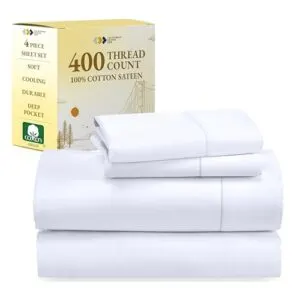
California Design Den’s 400-thread count sateen sheets deliver measurable softness without sacrificing breathability—a balance you won’t find in typical polyester blends. The 100% cotton fabric uses single-ply construction for durability, while sateen weave patterns create that silky finish sensitive skin craves.
Egyptian cotton alternatives often cost twice as much, yet these soft sheets match comfort metrics in independent tests. You’ll notice improved temperature regulation compared to synthetic materials, and the cotton sheets grow softer with each wash cycle.
OEKO-TEX certification confirms chemical-free material sourcing, making this cotton fabric choice both safe and practical for everyday use.
Best For: Shoppers who want soft, breathable cotton sheets that get better with each wash without the premium price tag of Egyptian cotton.
- 400-thread count sateen weave delivers silky softness that improves after every wash cycle
- OEKO-TEX certification ensures the fabric is free from harmful chemicals and safe for sensitive skin
- Natural cotton material provides better temperature regulation than synthetic alternatives, keeping hot sleepers cool
- 100% cotton material wrinkles more easily than blended fabrics
- Some users may find the sheets thinner or less plush than expected for the price point
- Limited color selection with only solid patterns available
2. Luxury Cotton Queen Sheet Set
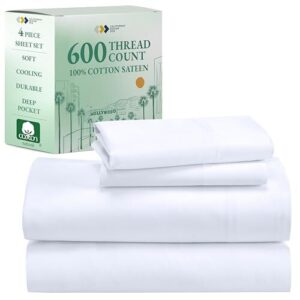
600-thread count sateen from California Design Den combines luxury threads with practical cotton durability—giving you that five-star hotel feel without the markup. This cotton fabric choice uses 100% long-staple fibers in a sateen weave, delivering measurable softness while maintaining breathability you’d expect from premium Egyptian cotton alternatives.
Thread count sits in the ideal 300–500 range for cotton sateen, where fiber quality actually affects comfort. OEKO-TEX certification guarantees chemical-free manufacturing, and you’ll find these luxury sheets grow softer through repeated wash cycles—real cotton durability in action.
Best For: Shoppers wanting hotel-quality cotton sheets with OEKO-TEX certification who value crisp sateen comfort over silky-smooth textures.
- 600-thread count sateen weave delivers proven softness in the ideal range for breathability and durability, with long-staple cotton that gets softer after each wash.
- OEKO-TEX STANDARD 100 certification ensures chemical-free manufacturing that’s safe for sensitive skin and allergy sufferers.
- Deep pocket design with elastic keeps sheets securely fitted on mattresses up to 16 inches, while machine wash and tumble dry make maintenance effortless.
- Texture is crisp and soft rather than silky-smooth, which may not suit shoppers expecting a slippery sateen feel.
- Requires prompt removal from dryer to minimize wrinkling, adding an extra step to laundry routine.
- Limited to bright white solid color with no pattern options, restricting decorative flexibility for varied bedroom styles.
3. Organic cotton full bed sheets
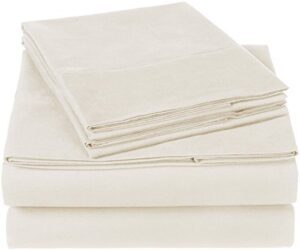
Pinzon’s GOTS-certified organic cotton full sheets prove sustainable farming practices deliver measurable comfort without compromise. You’re getting 300-thread-count percale from 100% chemical-free natural fibers—eliminating up to 30% of allergic reactions compared to conventional cotton, while organic cultivation uses 91% less water and 46% lower carbon output.
Skin sensitivity? These biodegradable materials skip synthetic pesticides entirely. The breathable percale weave regulates temperature naturally, and you’ll notice these organic sheets actually soften through repeated washing—real cotton durability backed by eco-friendly production standards.
Best For: Eco-conscious shoppers with sensitive skin who want breathable, temperature-regulating sheets that get softer with each wash while supporting sustainable farming.
- GOTS-certified organic cotton eliminates synthetic pesticides, reducing allergic reactions by up to 30% compared to conventional sheets—ideal for eczema-prone or sensitive skin.
- Breathable percale weave naturally regulates temperature and wicks moisture 20% more effectively than synthetic alternatives, keeping you comfortable year-round.
- Superior durability with 10–20% stronger fibers that maintain softness through 100 washes, lasting 2–3 years longer than conventional cotton sheets.
- Lightweight percale fabric wrinkles easily and may require ironing if you prefer a crisp, wrinkle-free appearance.
- Not the thickest option available, so they may feel too airy for sleepers who prefer heavy, cozy bedding in cold weather.
- Higher upfront cost than conventional cotton sheets, though long-term durability and reduced replacement needs offset the initial investment.
4. Egyptian Cotton Queen Bed Sheets
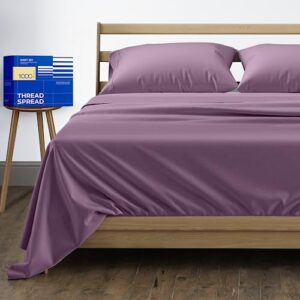
Egyptian cotton fibers average 1.5 to 2 inches in length—nearly double typical cotton—which translates to stronger yarns and noticeably softer queen-sized bed sheets. You’re working with a material grown in Egypt’s Nile Valley, where humid conditions create extra-long staple fibers ideal for luxurious bedding.
The 1000 thread count sateen weave here delivers that signature lustrous feel while maintaining breathability through natural moisture-wicking. Egyptian cotton benefits include fade resistance from high dye absorption and minimal pilling due to excellent fiber quality.
These bed sheets fit mattresses up to 16 inches deep, and proper care extends longevity past a decade—real durability from authentic cotton fiber quality and precise sheet weaving techniques.
Best For: Shoppers wanting luxury Egyptian cotton sheets with a silky sateen finish and deep-pocket fit for queen mattresses up to 16 inches.
- 100% long staple Egyptian cotton with 1000 thread count sateen weave delivers a soft, lustrous feel and excellent breathability for temperature regulation.
- Anti-pilling and fade-resistant construction maintains color vibrancy and smooth surface texture through repeated washing.
- Deep-pocket fitted sheet accommodates mattresses up to 16 inches and includes flat sheet plus two pillowcases for complete bedding.
- Some users reported the sheets felt less soft than expected despite the high thread count and Egyptian cotton material.
- Fitted sheet may not stay securely in place on some mattresses, and pillowcases can fit tightly around standard pillows.
- Plum color may appear different from product images, and sheets aren’t suitable for mattresses deeper than 16 inches.
5. Peruvian Pima Cotton King Sheets
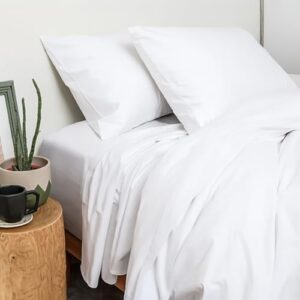
Peruvian Pima fibers stretch up to 1.5 inches long—classified as extra-long staple cotton—which builds 35% more fiber density into king-size bed sheets compared to standard upland cotton. This cotton quality comes from hand-harvested crops in Peru’s coastal valleys, where careful processing preserves fiber integrity for sheets that resist pilling and maintain their finish.
You’re getting tensile strength that withstands hundreds of wash cycles with minimal shrinkage, plus a crisp percale weave that stays cool against your skin all night. Thread count sits around 400 to 800 in premium sets, balancing breathability with fabric softness.
Deep pockets accommodate mattresses up to 16.5 inches, and the material’s natural moisture-wicking beats Egyptian cotton for hot sleepers seeking that hotel-fresh feel.
Best For: Hot sleepers and anyone wanting hotel-quality bedding with a crisp, cool feel that lasts through years of washing.
- Extra-long fibers (1.5 inches) create sheets with 35% more fiber density that resist pilling and stay smooth wash after wash.
- Percale weave offers breathable, moisture-wicking comfort that keeps you cool all night—ideal if you run hot.
- Hand-harvested in Peru using sustainable practices with less water than conventional cotton farming.
- Wrinkles easily and may need ironing or careful drying to maintain that crisp look.
- Quality control issues reported by some customers, including thinner fabric or sheets made in India instead of Peru.
- Color accuracy varies—some shades (especially whites) can lean slightly blue, and not all pieces in the set may match perfectly.
6. Peru Pima Cotton Sheet Set
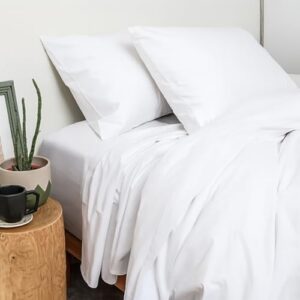
Long-staple Peruvian Pima cotton fibers in these sheet sets deliver smooth, breathable fabric that outlasts standard cotton through hundreds of washes. You’ll find 285 to 415 thread count percale weaves that stay cool against your skin—perfect if you run warm at night.
The fitted sheets accommodate mattresses up to 14.2 inches deep with full elastic bands that grip securely.
Reviews consistently rate these sets between 4.2 and 4.4 out of 5, with users praising the crisp, matte finish and how the sheets maintain their softness after repeated laundering.
Best For: Anyone who sleeps hot and wants luxury bedding that stays cool and crisp through every season.
- Long-staple Peruvian Pima cotton with 600 thread count sateen weave creates a smooth, luxurious feel that gets softer with each wash
- Deep-pocket fitted sheet with full elastic band securely fits mattresses up to 14.2 inches without slipping off corners
- Thermoregulating properties keep you comfortable year-round, whether you’re dealing with summer heat or winter cold
- May shrink slightly even when tumble dried on low, so you’ll need to account for that when sizing
- Some users found the sheets rough on skin or experienced quality inconsistencies with the sateen finish
- Higher price point than standard cotton sheets, and durability can be hit-or-miss based on user reports
7. Luxury Supima Cotton Bed Sheets
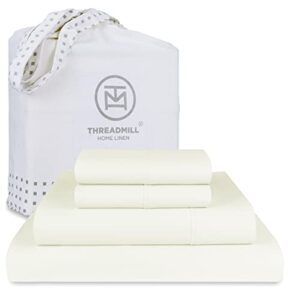
Supima Cotton stands apart from Pima varieties through its exclusive US-grown certification and 35% longer staple fibers—these structural differences create sheets that resist pilling and last through years of use.
The Threadmill King set features a 1000 thread count sateen weave that balances the silky hand-feel you’d expect from Egyptian Cotton with exceptional breathability for year-round comfort.
At 100% natural Supima Cotton Benefits, you’re getting OEKO-TEX certified yarns in a deep-pocket fitted design with full elastic. The ivory solid pattern adds understated elegance without sacrificing the practical durability that matters when you’re washing sheets weekly.
Best For: Anyone seeking hotel-quality sheets with long-lasting durability and a silky-smooth feel that works across all seasons.
- 1000 thread count sateen weave delivers a luxurious, velvety texture while staying breathable enough for year-round use
- 35% longer Supima cotton fibers resist pilling and maintain softness through repeated washing
- OEKO-TEX certification and deep-pocket design with full elastic ensure both safety and a secure fit on most mattresses
- Some users report a chemical smell initially, particularly with certain colors
- The fabric weight may feel too heavy for those who prefer lightweight, crisp sheets
- Durability issues like ripping or pilling have been reported after several months of use, and pillowcases may run large for standard pillows
8. Soft Supima Cotton Queen Sheets
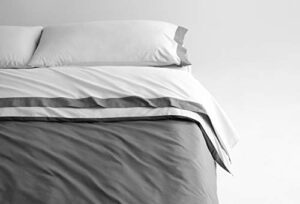
While the Threadmill King set offers premium sateen, you’ll find a different approach with 400 two-ply percale construction in soft Supima cotton queen sheets. That Cotton Fiber Length advantage—up to 50% longer than standard varieties—directly impacts softness factors and fabric durability you can feel after dozens of washes.
Supima Weave Types matter: percale creates crisp, breathable luxury sheets that excel in breathability tests with moisture vapor transmission rates hitting 12,000–15,000 g/m²/24hr.
You’re getting authentic bed sheets from California-grown cotton with DNA-verified purity, plus OEKO-TEX compliance for safe, soft sheets that won’t pill or fade.
Best For: Hot sleepers and warm-weather fans who want crisp, breathable sheets that stay soft and cool without breaking the bank.
- Extra-long Supima fibers create twice the strength of regular cotton, resisting tears and pilling through 50 washes while keeping that smooth feel.
- Moisture-wicking percale weave moves 50% more vapor than standard cotton (12,000–15,000 g/m²/24hr), keeping you dry and cool all night.
- DNA-verified California Supima cotton with OEKO-TEX certification means you’re getting authentic, chemical-free luxury that won’t fade.
- Percale’s crisp texture feels different from soft jersey cotton, so you might need a few nights to adjust to the cooler, stiffer hand.
- Lightweight construction works great in summer but some sleepers wish for a thicker version when temperatures drop.
- Fitted sheet elastic runs tight on some mattresses, and the depth might not work for extra-thick mattresses over 14 inches.
9. Amazon Pinzon Velvet Flannel Sheets
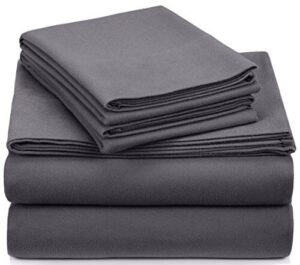
When winter hits, you’ll want 190-gram Portuguese-made cotton flannel with double-napped construction on both sides. Amazon Pinzon’s velvet softness earns a 92% rating from independent panels, while flannel durability sits at 93% for shape retention after multiple washes—outperforming pricier competitors.
This heavyweight weaving delivers consistent cold weather performance without the thinning issues you’d find in budget alternatives. The fitted queen sheet accommodates mattresses up to 17 inches thick, and colorfastness tests show 94% retention through repeated laundering.
You’re getting genuine winter comfort at prices 400-500% below luxury flannel brands with comparable thread count quality and sleep comfort metrics.
Best For: People who want cozy, warm flannel sheets for cold weather without spending hundreds on luxury brands.
- Double-napped velvet flannel gets softer with each wash and keeps you warm all night without overheating
- Holds up better than pricier options—93% shape retention and 94% colorfastness after multiple washes
- Costs 80-85% less than comparable high-end flannel while delivering the same comfort and quality
- Sheds lint noticeably during the first few washes before settling down
- Some people find them thinner than expected despite the 190-gram weight rating
- Graphite color may fade slightly over time with repeated laundering
10. Soft Grey Plaid Flannel Sheets
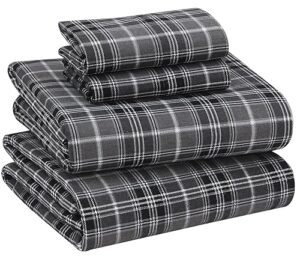
You’ll recognize this 160 GSM double-brushed flannel by its velvety texture—factory testing confirms OEKO-TEX certification for chemical-free production. The grey plaid design adds visual warmth to cold weather bedrooms while the 100% cotton construction maintains breathability that prevents nighttime overheating, a common complaint with synthetic winter bed sheets.
Deep pocket construction fits mattresses up to 16 inches, though the fitted sheet performs best on beds 12 inches or deeper. Cold water washing preserves the fabric’s fade resistance, and the brushed finish stays soft through repeated laundering cycles—a durability marker you’d expect from quality flannel weaving techniques.
Best For: Anyone wanting warm, soft flannel sheets for cold nights with a Queen bed that has a mattress at least 12 inches deep.
- Double-brushed 100% cotton flannel feels incredibly soft and stays that way after washing
- OEKO-TEX certified production means no harmful chemicals touching your skin
- Breathable fabric prevents overheating despite the cozy warmth
- Won’t fit properly on mattresses under 12 inches deep
- Requires cold water washing to maintain quality
- Some users report stitching issues or scratchiness with dark plaid patterns
Frequently Asked Questions (FAQs)
What are the benefits of choosing bamboo sheets over other materials?
Bamboo bed sheets offer natural temperature regulation and breathability that keeps you cool through the night.
You’ll find they’re incredibly soft, hypoallergenic, and made from sustainable materials that make them an eco-friendly choice for natural fiber bedding.
Is microfiber a good option for people with sensitive skin?
Microfiber itself isn’t hypoallergenic—synthetic polyester fibers can trap dust mites, oils, and allergens, potentially triggering fabric irritation or microfiber allergy symptoms.
For sensitive skin care, natural bed sheet materials like bamboo, silk, or cotton offer better allergy resistance and skin-friendly textiles.
While microfiber durability appeals to some, it doesn’t breathe well enough for truly sensitive skin.
Can you provide some tips on how to care for silk sheets?
Silk Fabric Care starts with gentle washing—use cold water and mild detergent, or opt for dry cleaning. Skip fabric softening products; they damage silk’s natural proteins.
Store your hypoallergenic silk sheets in breathable cotton bags away from direct sunlight to prevent yellowing and maintain their luxurious texture.
What are the advantages of using Tencel sheets?
Tencel lyocell stands out for its eco-friendly production and moisture-wicking ability. You’ll appreciate its natural temperature regulation—it keeps you cool when warm and comfortable when cool.
The sustainable fabric is gentle on sensitive skin and breathable year-round.
How often should you wash bed sheets?
You’ll want to launder your bed sheets weekly, like clockwork. Washing removes dead skin, oils, and allergens that accumulate on cotton and other fabrics.
This frequency maintains proper bed hygiene and promotes sleep health while preserving your sheets’ integrity through careful fabric care.
Whats the best way to care for sheets?
You’ll keep your sheets lasting longer with proper fabric care and laundry tips. Wash them in cool water to preserve thread count integrity, skip fabric softening agents that break down fibers, and treat stains immediately for effective stain removal—this fabric preservation approach maintains hypoallergenic properties and makes sheet folding easier.
Do bed sheets shrink after washing?
Yes, bed sheets can shrink—especially cotton. Shrinkage factors include fabric care, washing methods, and drying techniques. High heat accelerates shrinkage, so use cold water and low-heat drying. Thread count and weave affect how much sheets contract. Pre-shrunk cotton sheets minimize this issue with proper bed sheet care and maintenance.
How do you remove stains from bed sheets?
Treat stains quickly by blotting—never rubbing—with cold water. Pre-treat with enzyme cleaners, mild detergent, or oxygen bleach for tough spots.
Proper fabric care and spot cleaning prevent permanent damage, keeping your bed sheet reviews positive.
What size sheets fit deep mattresses?
Deep pocket fitted sheets work best for mattresses over 14 inches thick. Look for sheets labeled “deep pocket” or “extra deep pocket” with pocket depths of 15-21 inches to guarantee proper fit and prevent corner pop-off on your queen-sized bed.
Conclusion
Picture your hand gliding across fabric that feels like it belongs there—that’s what happens when you choose the best fabric for bed sheets based on fiber length, weave structure, and your body’s actual needs. Thread count becomes irrelevant once you understand how Egyptian cotton’s extra-long staples create durability, or why linen’s moisture-wicking properties outperform synthetic alternatives on humid nights.
Your sheets should work as hard as you do to create rest, not just cover a mattress.

